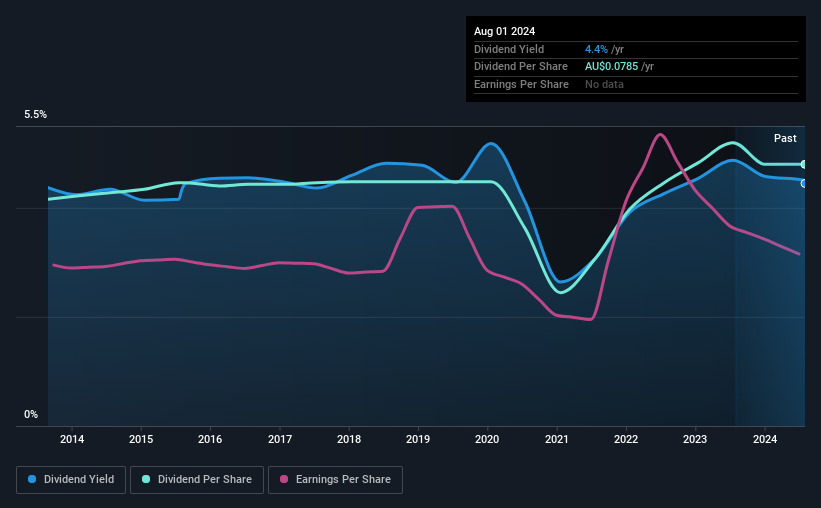- Australia
- /
- Capital Markets
- /
- ASX:BKI
Why It Might Not Make Sense To Buy BKI Investment Company Limited (ASX:BKI) For Its Upcoming Dividend

Regular readers will know that we love our dividends at Simply Wall St, which is why it's exciting to see BKI Investment Company Limited (ASX:BKI) is about to trade ex-dividend in the next four days. The ex-dividend date occurs one day before the record date which is the day on which shareholders need to be on the company's books in order to receive a dividend. It is important to be aware of the ex-dividend date because any trade on the stock needs to have been settled on or before the record date. Thus, you can purchase BKI Investment's shares before the 6th of August in order to receive the dividend, which the company will pay on the 29th of August.
The company's next dividend payment will be AU$0.04 per share, and in the last 12 months, the company paid a total of AU$0.078 per share. Based on the last year's worth of payments, BKI Investment stock has a trailing yield of around 4.4% on the current share price of AU$1.765. Dividends are an important source of income to many shareholders, but the health of the business is crucial to maintaining those dividends. As a result, readers should always check whether BKI Investment has been able to grow its dividends, or if the dividend might be cut.
See our latest analysis for BKI Investment
Dividends are usually paid out of company profits, so if a company pays out more than it earned then its dividend is usually at greater risk of being cut. Last year, BKI Investment paid out 98% of its income as dividends, which is above a level that we're comfortable with, especially if the company needs to reinvest in its business.
When a company pays out a dividend that is not well covered by profits, the dividend is generally seen as more vulnerable to being cut.
Click here to see how much of its profit BKI Investment paid out over the last 12 months.

Have Earnings And Dividends Been Growing?
Businesses with shrinking earnings are tricky from a dividend perspective. If earnings fall far enough, the company could be forced to cut its dividend. That's why it's not ideal to see BKI Investment's earnings per share have been shrinking at 4.9% a year over the previous five years.
Another key way to measure a company's dividend prospects is by measuring its historical rate of dividend growth. BKI Investment has delivered an average of 1.4% per year annual increase in its dividend, based on the past 10 years of dividend payments.
The Bottom Line
Has BKI Investment got what it takes to maintain its dividend payments? Not only are earnings per share shrinking, but BKI Investment is paying out a disconcertingly high percentage of its profit as dividends. It's not that we hate the business, but we feel that these characeristics are not desirable for investors seeking a reliable dividend stock to own for the long term. All things considered, we're not optimistic about its dividend prospects, and would be inclined to leave it on the shelf for now.
Having said that, if you're looking at this stock without much concern for the dividend, you should still be familiar of the risks involved with BKI Investment. For example, we've found 1 warning sign for BKI Investment that we recommend you consider before investing in the business.
Generally, we wouldn't recommend just buying the first dividend stock you see. Here's a curated list of interesting stocks that are strong dividend payers.
Valuation is complex, but we're here to simplify it.
Discover if BKI Investment might be undervalued or overvalued with our detailed analysis, featuring fair value estimates, potential risks, dividends, insider trades, and its financial condition.
Access Free AnalysisHave feedback on this article? Concerned about the content? Get in touch with us directly. Alternatively, email editorial-team (at) simplywallst.com.
This article by Simply Wall St is general in nature. We provide commentary based on historical data and analyst forecasts only using an unbiased methodology and our articles are not intended to be financial advice. It does not constitute a recommendation to buy or sell any stock, and does not take account of your objectives, or your financial situation. We aim to bring you long-term focused analysis driven by fundamental data. Note that our analysis may not factor in the latest price-sensitive company announcements or qualitative material. Simply Wall St has no position in any stocks mentioned.
Have feedback on this article? Concerned about the content? Get in touch with us directly. Alternatively, email editorial-team@simplywallst.com
About ASX:BKI
Excellent balance sheet with questionable track record.
Market Insights
Community Narratives



